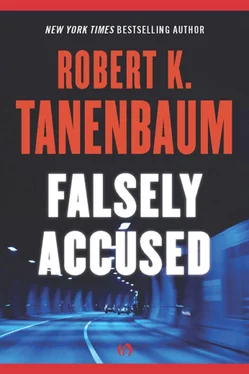Robert Tanenbaum - Falsely Accused
Здесь есть возможность читать онлайн «Robert Tanenbaum - Falsely Accused» весь текст электронной книги совершенно бесплатно (целиком полную версию без сокращений). В некоторых случаях можно слушать аудио, скачать через торрент в формате fb2 и присутствует краткое содержание. Год выпуска: 2010, Издательство: Open Road Integrated Media, Жанр: Криминальный детектив, на английском языке. Описание произведения, (предисловие) а так же отзывы посетителей доступны на портале библиотеки ЛибКат.
- Название:Falsely Accused
- Автор:
- Издательство:Open Road Integrated Media
- Жанр:
- Год:2010
- ISBN:нет данных
- Рейтинг книги:5 / 5. Голосов: 1
-
Избранное:Добавить в избранное
- Отзывы:
-
Ваша оценка:
- 100
- 1
- 2
- 3
- 4
- 5
Falsely Accused: краткое содержание, описание и аннотация
Предлагаем к чтению аннотацию, описание, краткое содержание или предисловие (зависит от того, что написал сам автор книги «Falsely Accused»). Если вы не нашли необходимую информацию о книге — напишите в комментариях, мы постараемся отыскать её.
Falsely Accused — читать онлайн бесплатно полную книгу (весь текст) целиком
Ниже представлен текст книги, разбитый по страницам. Система сохранения места последней прочитанной страницы, позволяет с удобством читать онлайн бесплатно книгу «Falsely Accused», без необходимости каждый раз заново искать на чём Вы остановились. Поставьте закладку, и сможете в любой момент перейти на страницу, на которой закончили чтение.
Интервал:
Закладка:
“Fresh fish,” said Bello, deadpan.
“Why, Harry,” said Marlene in a tone of exaggerated wonder. “I believe that you have just made a light or humorous remark. You know, I think retirement is going to do you some good.”
Phil DeLino’s call caught Karp just as he was about to leave. He stood in his office holding his coat and took it.
“May twenty-third,” said DeLino.
“What’s May twenty-third?” asked Karp.
“What you were so hot to find out. I spoke to His Honor and went over his calendars. May twenty-third is the first date that we can remember Bloom bringing up that we ought to fire Murray Selig. After that it was the subject of lots of calls and at least three meetings.”
“Why?” Karp asked with growing interest. “What was the reason? And why just then?”
“I drew a blank there, buddy. The Mayor doesn’t know either. Guy just got a bug in his bonnet.”
“Mmm. Maybe. Look, thanks, Phil, and if you chance across anything else, I’d appreciate knowing about it.”
“Will do. By the way, the Mayor enjoyed his session with you. It made him wish he was still practicing law. And he told me to tell you, quote, when Jack Weller fires his sorry Jewish ass, he can come by and work for me, unquote.”
Stupenagel drove slowly up Lexington Avenue in East Harlem, trying to steer the ancient black Chevy around the worst potholes. The shocks were nearly gone, and when she went over a bad one the jolt made her teeth clatter. It was her third night on the job, and she had by now acquired the greatest respect for the way in which gypsy cab drivers made their living.
She was wearing a tattered leather jacket and had a greasy Mets cap pulled down over her eyes. It did not do Stupenagel’s vanity much good to be able to pass as a man so easily, but it had often been useful to her professionally. She was good at it too. The guy running the garage, a Dominican, had barely looked at her before sending her out in his worst beater.
The garage boss was, in fact, only interested in the phony license she presented, and her demonstrated facility in both Spanish and English. Gypsy hacks didn’t last long in New York, and bilingual ones were a prize. She had a crackling dashboard-mounted radio that occasionally squawked her number and told her where to go for a pickup. The gypsies, she was learning, fulfilled an essential social purpose, in that they were the only automobile transportation available to the City’s legions of poor. Into her cab whole families had piled, clown-car fashion, to go to a christening or a funeral, and when the poor moved, which was often, they loaded their entire worldly store into the gypsies for shipment from one rotten apartment to another. This much was legal.
The other side of the gypsy business (illegal) arose from the reluctance of the real taxicabs, the yellow ones with the high-priced official medallion from the hack bureau on their hoods, to travel in upper Manhattan, or other rough regions of the City, or to pick up from the street members of the darker-hued minorities.
It was, of course, well known that gypsy cabs picked up people who hailed them on the street. Since their cabs had no meters, each driver would engage in a brief negotiation with the passenger for the fare and then pocket it. The garage that owned the cab only had claim to the radio pickup fares, and it was understood that gypsy cabbies would supplement their fares in this way; indeed, it was virtually a necessity of survival, given the miserable wage paid by the garages.
Stupenagel had done plenty of street pickups, far more than was usual for real gypsies, who had constantly to worry about being pinched by hack bureau inspectors or cops. She, on the other hand, was looking to get caught, and in three days she had taken in over two hundred dollars.
There was a man standing in the avenue at 147th, under a streetlamp, with his hand up. Stupenagel swerved and slowed and looked the man over. A short man, vanilla gringo or P.R., with a mustache, wearing a raincoat and a leather porkpie hat with the brim turned up. She figured him for a musician; uptown musicians made up a considerable proportion of the gypsies’ late business. She stopped and the man got in.
“Where to, man?” she asked, pitching her voice low.
He leaned forward and held out a gold shield in a leather holder. “Make this next right and pull over,” he said.
“Ah, shit!” she said. “You from the hack bureau?”
“Shut up and move it!” he replied.
She made the turn, and her passenger directed her to park behind a black Plymouth Fury.
A man got out of the Fury. The passenger said, “Get out!” and she did and he did too. The man from the Fury was large and dark and wearing an expensive tan topcoat. He had a broad, heavy-browed face, on which he carried that peculiar expression, both amused and predatory, characteristic of men confident in some arbitrary power, shortly to be used. Stupenagel had seen it dozens of times around the world, on Eastern European apparatchiki and policemen, on guerillas at Central American crossroads, on the officers trying to extirpate those guerillas. She had not encountered it before in her own country, however, and she felt the beginnings of fear.
“You been a naughty boy, Pedro,” said the big man, coming closer and looking her up and down. “You picked up a fare off the street without a license.” He held out a meaty hand. “Give it over!”
“What?” asked Stupenagel stupidly.
The hand flew up in a blur and cracked her across the jaw. She sprawled backward against the cab’s fender.
“Hey, he ain’t a spic, Paulie,” remarked the other man.
“No, he sure ain’t,” agreed the big man. “Hey, shitface, what’s a white man doing driving a gypsy up in greaser heaven?”
Stupenagel’s head was still ringing from the blow, and she didn’t answer. The big man kicked her painfully in the ankle.
“ Pzhalsteh, gospodin, pzhalsteh …” she gasped in the most obsequious voice she could manage.
“What’s that, Polack?” asked the other man.
“Or Russian. You a Russky, shitface?”
“Yes … Russian,” Stupenagel answered.
“Jesus, the fuckin’ foreigners are taking over the damn country,” said the big man. “You understand money, right? Stand the fuck up when I talk to you! Let’s have the money.”
Stupenagel stood and dug into the pocket of her leather jacket, coming out with a thick wad of bills, which the big man snatched from her hand.
“Hey, hey, look at this!” the man exclaimed. “You been a hard worker, boy.” He separated out most of the bills and let the rest, mostly singles, drop to the pavement. After a second’s hesitation she stooped and picked them up.
“That’s for your license. You understand license?” the big man said in the unnaturally loud voice used to communicate with idiots and foreigners. “But look, Ivan, you got to renew it every week, understand? Today’s Wednesday-you understand?”
“Yes, Vednesday,” said Stupenagel.
“You come back here every Wednesday, this time. You have a hundred for me, yes? Understand?”
Stupenagel nodded.
The big man grinned at her. He had white, evenly capped teeth, she noticed, the kind that very few of the people who drove gypsy cabs had in their mouths. “Good,” he said. “But if you drive in my neighborhood without a license … not good.” He popped her on the shoulder a couple of times, playfully but hard. “Boom, boom, go to jail. Understand? Okay, get the fuck out of here! Back to work!”
He turned away, dismissing her. She climbed back into the Chevy, cranked it up, and drove off. She went directly to the garage, which was in Inwood, by the river, parked, and went into the tiny garage office. When she turned her keys, money, and trip sheets in to the night man, he looked meaningfully at the clock.
Читать дальшеИнтервал:
Закладка:
Похожие книги на «Falsely Accused»
Представляем Вашему вниманию похожие книги на «Falsely Accused» списком для выбора. Мы отобрали схожую по названию и смыслу литературу в надежде предоставить читателям больше вариантов отыскать новые, интересные, ещё непрочитанные произведения.
Обсуждение, отзывы о книге «Falsely Accused» и просто собственные мнения читателей. Оставьте ваши комментарии, напишите, что Вы думаете о произведении, его смысле или главных героях. Укажите что конкретно понравилось, а что нет, и почему Вы так считаете.












